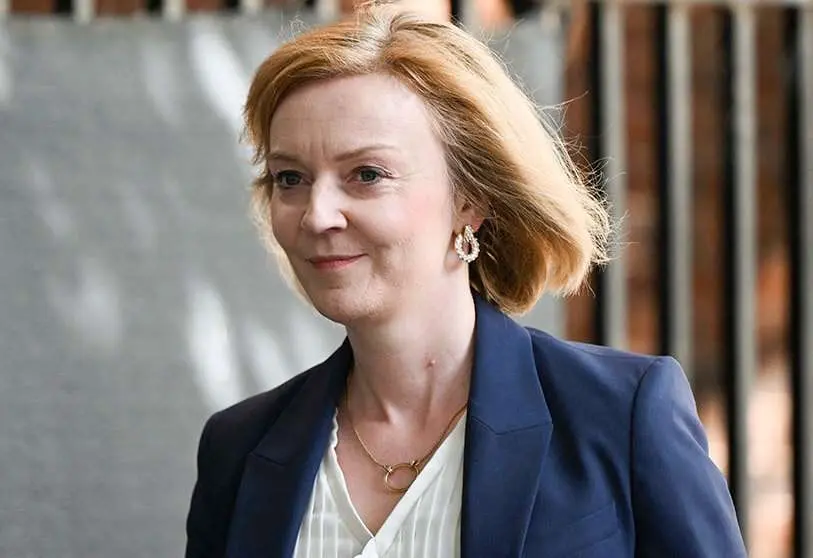Yes, in Liz we Truss

The title of this article is taken from one of the banners that the Foreign Minister's supporters used to support her candidacy for the post of Prime Minister, a play on words that refers to the In God we trust, which appears on dollar notes. In the end, and in line with all the polls, Tory militants have crowned Liz Truss as head of Her Majesty's Government, the third woman to do so after Margaret Thatcher and Theresa May. The successor to the controversial and eccentric Boris Johnson claims to be more Thatcher than May, that is to say, more iron fist than appeasement. Whatever tactics and style she finally adopts, she will not have it easy; the legacy left by her predecessor is described as "poisoned" by many sectors because, in fact, the scale of the problems and challenges is enormous, and there are no favourable conditions for magic recipes.
Truss's eventual triumph over her rival, the dapper Indian-descended billionaire former Finance Minister Rishi Sunak, may have been based in large part on his loyalty to the ousted Johnson. Yes, it is curious that, in these times of relative convictions, conditional affections and self-interested actions, loyalty is still a valued commodity. Also, the conservative electorate has been more sensitive to the siren songs it wants to hear than to prescriptions closer to Sir Winston Churchill's "blood, sweat, tears and toil". Indeed, Truss has promised to lower taxes, arguing that "this is at the heart of conservative ideology". Aware that today's generation is not in the mood for castor oil, the very orthodox Sunak had agreed to promise the same, albeit on the precondition of lowering inflation, that cancer capable of eating away at even the most seemingly solid economic structures.
Electing the leader of the Conservative Party when he has been ousted from 10 Downing Street means that he or she will automatically be elevated to head of government, subject, of course, to being put in charge by the Queen. But the tiny number of voters who ultimately decide who will be the country's top executive seems unrepresentative of a growing majority of voters. It is true that this procedure avoids the enormous expense of an early general election, but it is no less true that, when a prime minister loses the confidence of his or her own party, it is the entire government that is questioned, and resolving this through an exclusive vote of the party's own membership - barely 200,000 voters - is more akin to the privileges of another era than to a representative democracy.
Of course, it is up to the British to resolve this and other questions about their unquestioned democracy. In any case, the result is what it is and, for better or worse, what Truss does will have an impact not only on British politics but also on the whole world, starting with the territory closest to home, namely the European Union.
The one-time supporter of the UK remaining in the EU is now a Brexit enthusiast, and the first major challenge to be resolved is the Irish protocol, the main stumbling block to the smooth relationship that was promised when Johnson signed it and proclaimed to the four winds that London was regaining control of its own destiny. Breaking the fragile balance of that agreement could lead to major tectonic shifts in the Irish Sea, where nationalists are also waiting for their chance to take up their long-held aspiration to reunify the island.
Also, in relation to this presumed recapture of border control, Liz Truss will have to look for more imaginative solutions than Boris Johnson's scheme to relocate asylum seekers in African countries such as Rwanda, who, in return for a stipend, would be charged with the care and custody of those who thought they had found the promised land as soon as they landed on British shores.
On the domestic front, the spate of strikes in the public sector will not only affect the whole country, but its effects will continue to make Europeans desperate, especially those who dispatch goods and who have made the route and stay of EU lorry drivers in Britain a nightmare.
On the contrary, it is to be expected that the UK will remain Ukraine's most active ally, along with the US, and that there will be no change in the determination to make Vladimir Putin back down from his imperialist ambitions, both over Ukraine and over the old cushion of former USSR satellite countries.
Liz Truss has become no less than the 56th person to hold the office of Prime Minister, and the 15th to be commissioned by Queen Elizabeth II. If all the current signs in London and Balmoral of the "end of the reign" are confirmed, she would be the last to have received such a commission from the longest reigning monarch in history.

